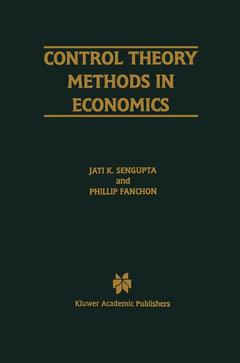Control Theory Methods in Economics, Softcover reprint of the original 1st ed. 1997
Langue : Anglais
Auteurs : Sengupta Jati, Fanchon Phillip

Control theory methods in economics have historically developed over three phases. The first involved basically the feedback control rules in a deterministic framework which were applied in macrodynamic models for analyzing stabilization policies. The second phase raised the issues of various types of inconsistencies in deterministic optimal control models due to changing information and other aspects of stochasticity. Rational expectations models have been extensively used in this plan to resolve some of the inconsistency problems. The third phase has recently focused on the various aspects of adaptive control. where stochasticity and information adaptivity are introduced in diverse ways e.g .? risk adjustment and risk sensitivity of optimal control, recursive updating rules via Kalman filtering and weighted recursive least squares and variable structure control methods in nonlinear framework. Problems of efficient econometric estimation of optimal control models have now acquired significant importance. This monograph provides an integrated view of control theory methods, synthesizing the three phases from feedback control to stochastic control and from stochastic control to adaptive control. Aspects of econometric estimation are strongly emphasized here, since these are very important in empirical applications in economics.
1 Introduction to Control Theory.- 1.1 Transition from the calculus of variations to optimal control.- 1.2 Transition from theory to practice.- References.- 2 Continuous Time Models.- 2.0 Overview of control problems.- 2.1 Observability and controllability.- 2.2 Stability analysis.- 2.3 The maximum principle.- 2.4 Constraints.- 2.5 Example 1; A limit pricing model..- 2.6 Example 2; reaching a steady state cycle.- References.- 3 Discrete Time Models.- 3.0 Introduction.- 3.1 General deterministic and discrete control problems.- 3.2 The linear quadratic problem.- 3.3 Analytic solution of the Riccati equation.- 3.4 Equivalent dynamic equations.- 3.5 Discrete control of nonlinear systems.- 3.6 Observability and observers.- 3.7 Economic examples.- References.- 4 Stochastic Control Theory.- 4.0 Introduction.- 4.1 Stochastic processes under control.- 4.2. Economic applications.- 4.3 Kalman filtering methods.- 4.4 Concluding remarks.- References.- 5 Economic Implications of Stochastic Control.- 5.0 Introduction.- 5.1 Time inconsistency problems.- 5.2 Short-run vs. long-run optimality.- 5.3 Model of adjustment costs with rational expectations.- 5.4 An application to new growth theory: dynamic adjustments with learning by doing.- 5.5 Concluding remarks..- References.- 6 Variable Structure Systems.- 6.0 Introduction.- 6.1 The variable structure control formulation.- 6.2 A VSC approximation of an optimal control law.- 6.3 Example; The expectations-augmented Phillips relation.- 6.4 Concluding remarks.- References.- 7 Risk Sensitivity, Adjustment of Control and Estimation.- 7.0 Introduction.- 7.1 Learning process in differential games.- 7.2 Adjustment costs in portfolio models.- 7.3 Econometric estimation of controlled systems.- 7.4 Estimating transversality conditions.- 7.5 Concluding remarks.- References.
Date de parution : 10-2012
Ouvrage de 258 p.
15.5x23.5 cm
Thèmes de Control Theory Methods in Economics :
Mots-clés :
© 2024 LAVOISIER S.A.S.
